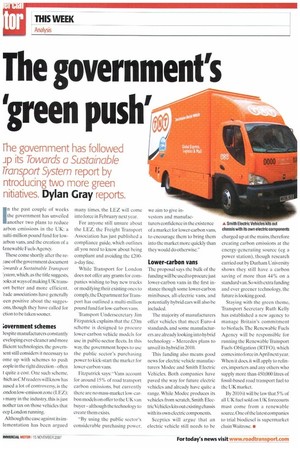The government's 'green push'
Page 22

If you've noticed an error in this article please click here to report it so we can fix it.
The government has followed Jpi its Towards a Sustainable Transport System report by ntroducing two more green
nitiatives. Dylan Gray reports.
In the past couple of weeks the government has unveiled another two plans to reduce arbon emissions in the UK: a nulti-million pound fund for lowarbon vans, and the creation of a tenewable Fuels Agency These come shortly after the remse of the government document -owards a Sustainable Transport 'ystem,which, as the title suggests, )oks at ways of making UK transort better and more efficient. -rade associations have generally ,een positive about the sugges.ons, though they have called for ction to be taken sooner.
;overnment schemes )espite manufacturers constantly eveloping ever-cleaner and more fficient technologies, the governlent still considers it necessary to ome up with schemes to push eople in the right direction—often t quite a cost. One such scheme, thich as CM readers will know has used a lot of controversy, is the ,ondon low-emisson zone (LEZ): ) many in the industry this is just nother tax on those vehicles that eep London running.
Although the case against its imlementation has been argued many times, the LEZ will come into force in February next year.
For anyone still unsure about the LEZ, the Freight Transport Association has just published a compliance guide, which outlines all you need to know about being compliant and avoiding the £200a-day fine.
While Transport for London does not offer any grants for companies wishing to buy new trucks or modifying their existing ones to comply,the Department forTransport has outlined a multi-million pound fund for low-carbon vans.
Transport Undersecretary Jim Fitzpatrick explains that the £20m scheme is designed to procure lower-carbon vehicle models for use in public-sector fleets. In this way, the government hopes to use the public sector's purchasing power to kick-start the market for lower-carbon vans.
Fitzpatrick says: "Vans account for around 15% of road transport carbon emissions, but currently there are no mass-market low-carbon models on offer to the UK van buyer—although the technology to create them exists.
-By using the public sector's considerable purchasing power, we aim to give investors and manufacturers confidence in the existence of a market for lower-carbon vans, to encourage them to bring them into the market more quickly than they would do otherwise."
Lower-carbon vans The proposal says the bulk of the funding will be used to procure j ust lower-carbon vans in the first instance though some lower-carbon minibuses, all-electric vans, and potentially hybrid cars will also be included.
The majority of manufacturers offer vehicles that meet Euro-4 standards, and some manufacturers are already looking into hybrid technology — Mercedes plans to unveil its hybrid in 2010.
This funding also means good news for electric vehicle manufacturers Modec and Smith Electric Vehicles. Both companies have paved the way for future electric vehicles and already have quite a range. While Modec produces its vehicles from scratch, Smith Electric Vehicles kits out existing chassis with its own electric components.
Sceptics will argue that an electric vehicle still needs to be charged up at the mains, therefore creating carbon emissions at the energy-generating source (cg a power station), though research carried out by Durham University shows they still have a carbon saving of more than 44% on a standard van.So with extra funding and ever greener technology, the future is looking good.
Staying with the green theme, Transport Secretary Ruth Kelly has established a new agency to manage Britain's commitment to biofuels. The Renewable Fuels Agency will be responsible for running the Renewable Transport Fuels Obligation (RTFO), which comes into force in April next year. When it does, it will apply to refiners, importers and any others who supply more than 450,000 litres of fossil-based road transport fuel to the UK market.
By 2010 it will be law that 5% of all UK fuel sold on UK forecourts must come from a renewable source. One of the latest companies to trial biodiesel is supermarket chain Waitrose. •


























































































































































































